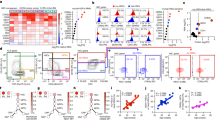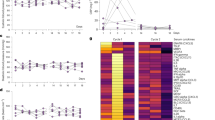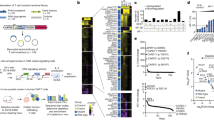Abstract
Epstein-Barr virus (EBV), a ubiquitous human herpesvirus and an aetiological agent of infectious mononucleosis, has a unique trop-ism for B lymphocytes1. Clinical and laboratory features of chronic active EBV infections are chronic or persistent infectious mononu-cleosis-like symptoms and high antibody titre against early anti-gens (EA)2–4 . Kawasaki disease (KD), aetiology unknown, is thought to be self-limited immunologically mediated vasculitis. Clinical features of KD are fever, rash, mucositis, lym-phadenopathy and coronary artery damage5,6. We report here a child with chronic active EBV infection accompanied by dilatation of coronary arteries. All the EBV-determined nuclear antigen (EBNA)-positive lymphocytes had exclusively CD4 antigen, as revealed by dual staining immunofluorescence analysis. Southern blot hybridization showed that the purified CD4+ cells harboured EBV genome.
This is a preview of subscription content, access via your institution
Access options
Subscribe to this journal
Receive 51 print issues and online access
$199.00 per year
only $3.90 per issue
Buy this article
- Purchase on Springer Link
- Instant access to full article PDF
Prices may be subject to local taxes which are calculated during checkout
Similar content being viewed by others
References
Epstein, M. A. & Achong, B. G. The Epstein-Barr Virus (eds Epstein, M. A. & Achong, B. G.) 1–22 (Springer, Berlin, 1979).
Alfieri, C., Ghibu, F. & Joncus, J. H. Can. med. Assoc. J. 131, 1249–1252 (1984).
Jones, J. F. et al. Ann. Int. Med. 102, 1–7 (1985).
Alfieri, C. & Joncas, J. H. J. Virol. 61, 3306–3309 (1987).
Kawasaki, T. et al. Pediatrics 54, 271–276 (1974).
Fujiwara, H. & Hamashima, Y. Pediatrics 61, 100–107 (1978).
Zimber, U. et al. Virology 154, 56–66 (1986).
Reedman, B. M. & Klein, G. Int. J. Cancer 11, 499–520 (1973).
Henle, W. et al. Science 169, 188–190 (1970).
Henle, G. & Henle, W. J. Bacterial. 91, 1248–1256 (1966).
Salahuddin, B. Z. et al. Science 234, 596–601 (1986).
Josephs, S. F. et al. Science 234, 601–603 (1986).
Tanner, J., Weis, J., Fearon, D., Whang, Y. & Kieff, E. Cell 50, 203–213 (1987).
Kikuta, H. et al. Pediatrics 73, 413–414 (1984).
Iwanaga, M. et al. Lancet 1, 938–939 (1981).
Kikuta, H. et al. Acta Paediatr. Jpn 28, 120 (1986).
Author information
Authors and Affiliations
Rights and permissions
About this article
Cite this article
Kikuta, H., Taguchi, Y., Tomizawa, K. et al. Epstein-Barr virus genome-positive T lymphocytes in a boy with chronic active EBV infection associated with Kawasaki-like disease. Nature 333, 455–457 (1988). https://doi.org/10.1038/333455a0
Received:
Accepted:
Issue Date:
DOI: https://doi.org/10.1038/333455a0
Comments
By submitting a comment you agree to abide by our Terms and Community Guidelines. If you find something abusive or that does not comply with our terms or guidelines please flag it as inappropriate.



